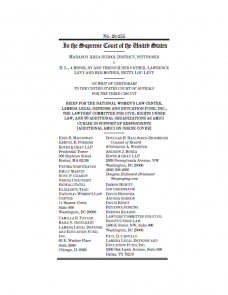Abortion rights, women of color, and LGBTQI+ people are under attack. Pledge to join us in fighting for gender justice.

 Update: On June 23, 2021, the U.S. Supreme Court ruled 8-1 in favor of the student, B.L., finding that her school violated her First Amendment free speech rights when it suspended her from the cheerleading team for an off-campus SnapChat post. In a decision that touched on many of the concerns raised in NWLC’s amicus brief, the Court rejected the school district’s argument that it must have unlimited authority to address student speech, even outside of the classroom, in order to protect students from harassment and bullying. Although the Court declined to articulate a specific test for when schools may be able to regulate off-campus speech, it left room for schools to address speech that legitimately harms students, like harassment and bullying. As NWLC’s amicus brief emphasized, the Court recognized that allowing schools to retain the authority to address legitimately harmful speech is vital for protecting students, particularly those of marginalized identities, from cyberbullying and other harassment that occurs outside of the schoolhouse gate. Read NWLC’s response to the decision here.
Update: On June 23, 2021, the U.S. Supreme Court ruled 8-1 in favor of the student, B.L., finding that her school violated her First Amendment free speech rights when it suspended her from the cheerleading team for an off-campus SnapChat post. In a decision that touched on many of the concerns raised in NWLC’s amicus brief, the Court rejected the school district’s argument that it must have unlimited authority to address student speech, even outside of the classroom, in order to protect students from harassment and bullying. Although the Court declined to articulate a specific test for when schools may be able to regulate off-campus speech, it left room for schools to address speech that legitimately harms students, like harassment and bullying. As NWLC’s amicus brief emphasized, the Court recognized that allowing schools to retain the authority to address legitimately harmful speech is vital for protecting students, particularly those of marginalized identities, from cyberbullying and other harassment that occurs outside of the schoolhouse gate. Read NWLC’s response to the decision here.
On March 31, 2021, the National Women’s Law Center, Lamda Legal Defense and Education Fund, Inc., and the Lawyers’ Committee for Civil Rights Under Law, along with our law firm partner Ropes & Gray LLP and 30 other organizations, filed an amicus brief to the U.S. Supreme Court in support of B.L., a student who was suspended from her high school’s cheerleading team for posting a Snapchat outside of school with the words “fuck cheer.” Our brief encourages the Court to carefully balance students’ rights to both free speech and safety by ensuring that schools are only allowed to punish off-campus speech that is harassing, bullying, or threatening. Such legitimately harmful speech disproportionately impacts students from historically marginalized groups—including girls and women, students of color, LGBTQ students, and students with disabilities—and we point out that schools can, and in some instances must, intervene. In addition, the brief cautions that students from these historically marginalized groups also face higher rates of unwarranted school discipline, so school officials should not be given power to punish any kind of speech merely because they consider it too “disruptive.” Thus, our brief concludes that schools should not be permitted to punish benign off-campus speech like B.L.’s, but that they should be allowed to address harassing, bullying, and threatening speech, regardless of where it takes place.
Read our blog post for more on this case.

